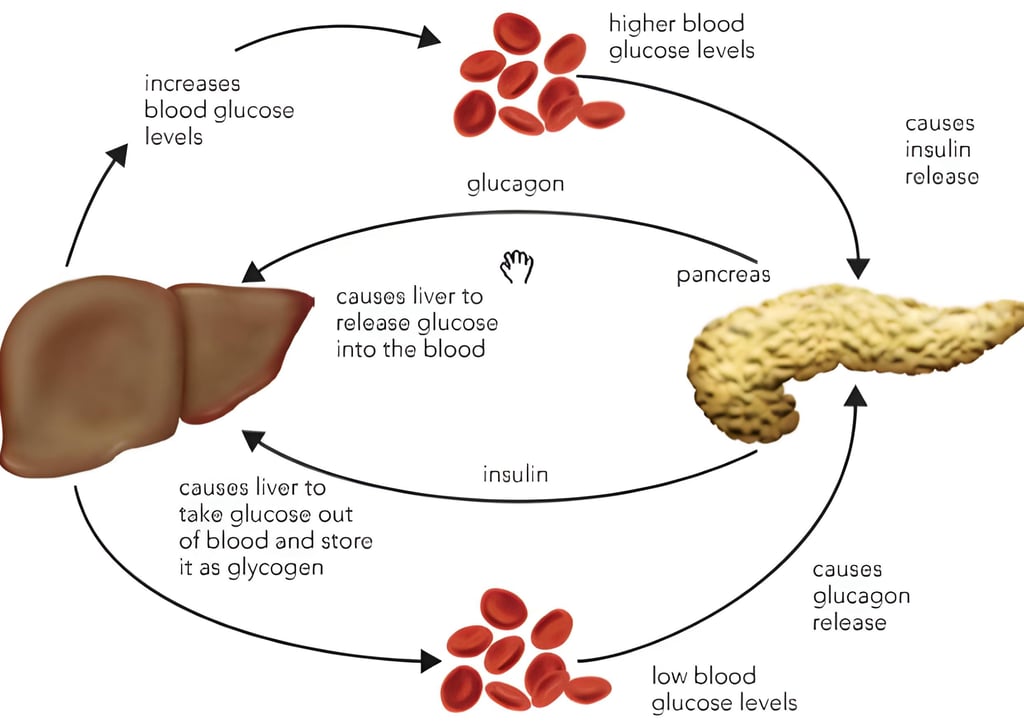Glycogen, Glucose, Liver, Insulin, and Diabetes
Understanding of Glycogen, Glucose, Liver, Insulin, and Diabetes: Mechanisms and Key Points for Study
PHD NOTES
1/13/20242 min read


(Image: edited from http://iolrevision.blogspot.com/2012/11/hormones.html)
Glycogen: The Body's Energy Reserve
Glycogen is a complex carbohydrate that serves as the primary energy storage molecule in animals, including humans. It is predominantly stored in the liver and muscles. When energy is needed, glycogen is broken down into glucose through a process called glycogenolysis. This glucose is then released into the bloodstream to fuel various bodily functions.
Key Points:
Glycogen is the body's energy reserve.
It is primarily stored in the liver and muscles.
Glycogenolysis is the process of breaking down glycogen into glucose.
Glucose is released into the bloodstream to provide energy.
Glucose: The Body's Primary Fuel
Glucose is a simple sugar and the primary source of energy for the body's cells. It is obtained through the breakdown of carbohydrates in the diet or through the conversion of glycogen in the liver. Glucose is transported through the bloodstream to various tissues, where it is used for energy production.
Key Points:
Glucose is the body's primary fuel.
It can be obtained from dietary carbohydrates or the breakdown of glycogen.
Glucose is transported through the bloodstream to provide energy to cells.
The Liver: Role in Glycogen and Glucose Regulation
The liver plays a crucial role in maintaining blood sugar levels by regulating the storage and release of glycogen and glucose. When blood glucose levels are high, the liver stores excess glucose as glycogen. Conversely, when blood glucose levels drop, the liver breaks down glycogen into glucose and releases it into the bloodstream to maintain a stable supply of fuel.
Key Points:
The liver regulates the storage and release of glycogen and glucose.
Excess glucose is stored as glycogen.
Glycogen is broken down into glucose when blood glucose levels are low.
The liver helps maintain stable blood sugar levels.
Insulin: Role in Blood Sugar Regulation
Insulin is a hormone produced by the pancreas that plays a crucial role in regulating blood sugar levels. When blood glucose levels rise after a meal, the pancreas releases insulin into the bloodstream. Insulin facilitates the uptake of glucose by cells, allowing them to use it for energy or store it as glycogen. It also inhibits the breakdown of glycogen and the release of glucose by the liver.
Key Points:
Insulin is a hormone produced by the pancreas.
It regulates blood sugar levels by facilitating glucose uptake by cells.
Insulin promotes glycogen synthesis and inhibits glycogen breakdown.
It helps maintain stable blood sugar levels.
Diabetes: A Disruption in Blood Sugar Regulation
Diabetes is a chronic condition characterized by high blood sugar levels. There are two main types of diabetes: type 1 and type 2.
In type 1 diabetes, the pancreas fails to produce insulin, leading to uncontrolled blood sugar levels.
In type 2 diabetes, the body becomes resistant to the effects of insulin, resulting in elevated blood glucose levels.
